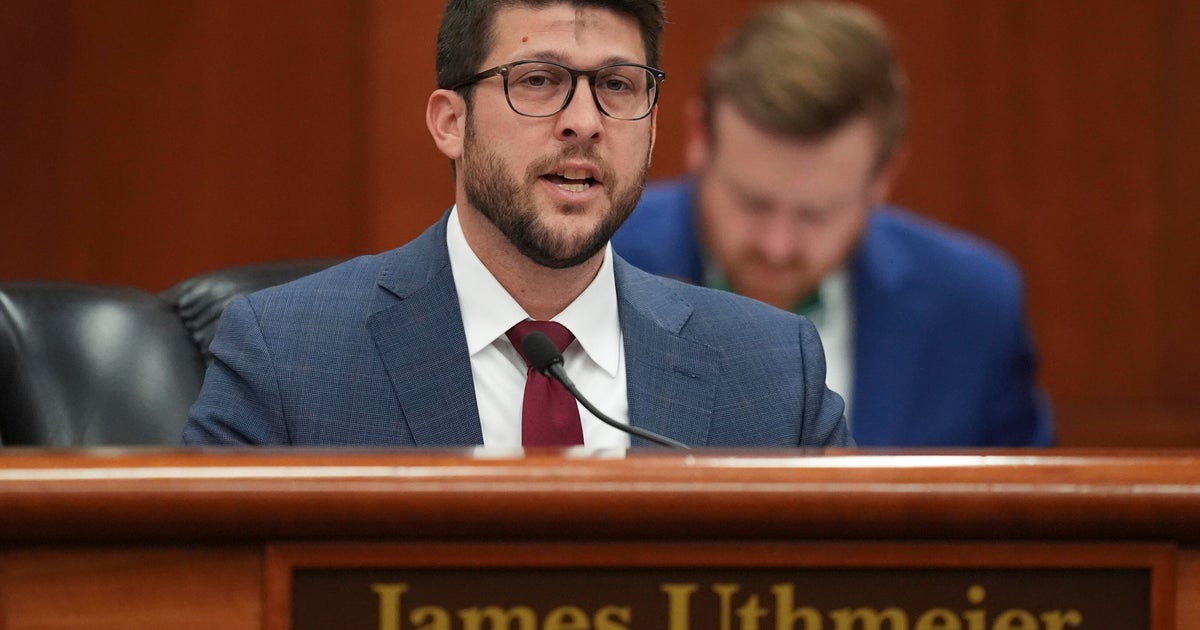ICE detained a Marine veteran's wife. He doesn't know how to tell their children where she went.
After U.S. Immigration and Customs Enforcement officers detained Marine Corps veteran Adrian Clouatre's wife last month, he doesn't know how to tell his children where their mother went.
When his nearly 2-year-old son Noah asks for his mother before bed, Clouatre just tells him, "Mama will be back soon." When his 3-month-old, breastfeeding daughter Lyn is hungry, he gives her a bottle of baby formula instead. He's worried how his newborn will bond with her mother absent skin-to-skin contact.
His wife, Paola, is one of tens of thousands of people in custody and facing deportation as the Trump administration pushes for immigration officers to arrest 3,000 people a day. Earlier this month, arrests by ICE during President Trump's second term topped 100,000, according to internal government data obtained by CBS News.
"They knew I was veteran, they just ripped her away from me and her children, from her breastfeeding, you know, newborn daughter, it's almost inhumane," Adrian Clouatre told CBS News.
Even as Marine Corps recruiters promote enlistment as protection for families lacking legal status, directives for strict immigrant enforcement have cast away practices of deference previously afforded to military families, immigration law experts say. The federal agency tasked with helping military family members gain legal status now refers them for deportation, government memos show.
To visit his wife, Adrian Clouatre has to make an eight-hour round trip from their home in Baton Rouge, Louisiana, to a rural ICE detention center in Monroe. Clouatre, who qualifies as a service-disabled veteran, goes every chance he can get.
Paola Clouatre, a 25-year-old Mexican national whose mother brought her into the country seeking asylum more than a decade ago, met Adrian Clouatre, 26, at a Southern California nightclub during the final months of his five years of military service in 2022. Within a year, they had tattooed each other's names on their arms.
After they married in 2024, Paola Clouatre sought a green card to legally live and work in the U.S. Adrian Clouatre said he is "not a very political person" but believes his wife deserved to live legally in the U.S.
"I'm all for 'get the criminals out of the country,' right?" he said. "But the people that are here working hard, especially the ones married to Americans — I mean, that's always been a way to secure a green card."
Detained at a green card meeting
The process to apply for Paola Clouatre's green card went smoothly at first, but eventually she learned ICE had issued an order for her deportation in 2018 after her mother failed to appear at an immigration hearing.
Clouatre and her mother had been estranged for years — Clouatre cycled out of homeless shelters as a teenager — and up until a couple of months ago, Clouatre had "no idea" about her mother's missed hearing or the deportation order, her husband said.
Adrian Clouatre recalled that a U.S. Citizenship and Immigration Services staffer asked about the deportation order during a May 27 appointment as part of her green card application. After Paola Clouatre explained that she was trying to reopen her case, the staffer asked her and her husband to wait in the lobby for paperwork regarding a follow-up appointment, which her husband said he believed was a "ploy."
Soon, officers arrived and handcuffed Paola Clouatre, who handed her wedding ring to her husband for safekeeping.
Adrian Clouatre, eyes welling with tears, said he and his wife had tried to "do the right thing" and that he felt ICE officers should have more discretion over arrests, though he understood they were trying to do their jobs.
"It's just a hell of a way to treat a veteran," said Carey Holliday, a former immigration judge who is now representing the couple. "You take their wives and send them back to Mexico?"
The Clouatres filed a motion for a California-based immigration judge to reopen the case on Paola's deportation order and are waiting to hear back, Holliday said.
On June 9, U.S. Citizenship and Immigration Services to social media about Paola Clouatre's case, writing that when Clouatre "was apprehended by @CBP and ordered removed by a judge in 2018, she chose to defy the order and stay in the U.S. 7 years later, she had another bad idea and applied for a Green Card. @ICEgov took her into custody at our New Orleans office. @DHSgov has a long memory and no tolerance for defiance when it comes to making America safe again."
However, Adrian Clouatre told CBS News of the 2018 order: "My wife was not only a minor, but homeless when that removal order was issued. Her mom skipped the appointment, my wife was living in a homeless shelter in CPS care. And there was no way for her to know about the removal order."
Adrian Clouatre also shared with CBS News Tuesday a letter he said he wrote to Mr. Trump and submitted through WhiteHouse.gov.
"I'm aware that purely by law my wife is considered an illegal immigrant," he wrote in the letter. "But she is being made to pay for the sins of her mother and has been inhumanly torn from her 2 young American children and American Veteran husband. We are married and have gone through the proper channels. We found out about her removal order about a week before we went to the USCIS interview and were honest about it hoping to have time to resolve the issue."
Jeff Migliozzi, spokesperson for the Washington, D.C.-based migrant advocacy group Freedom for Immigrants, told CBS News in a statement: "The scheduled ICE check-in arrest, like what happened here, has been a popular tactic under this administration in order to achieve higher numbers. The practice really underscores the cruelty and injustice of this administration's immigration policy -- here you have people doing all they can to follow the rules you gave them, and then you pull the rug out from under them. The result is separated families and shattered lives. It's appalling."
Less discretion for military families
Department of Homeland Security spokesperson Tricia McLaughlin said in an emailed statement that Paola Clouatre "is in the country illegally" and that the administration is "not going to ignore the rule of law."
"Ignoring an Immigration Judge's order to leave the U.S. is a bad idea," U.S. Citizenship and Immigration Services said in a June 9 which appeared to refer to Clouatre's case. The agency added that the government "has a long memory and no tolerance for defiance when it comes to making America safe again."
Adrian Clouatre said the agency's X post does not accurately reflect his wife's situation because she entered the country as a minor with her mother, seeking asylum.
"She was not aware of the removal order, so she was not knowingly defying it," he said. "If she had been arrested, she would have been deported long ago, and we would never have met."
Prior to the Trump administration's push to drive up deportations, USCIS provided much more discretion for veterans seeking legal status for a family member, said Holliday and Margaret Stock, a military immigration law expert.
In a , the agency said it "will no longer exempt" from deportation people in groups that had received more grace in the past. This includes the families of military personnel or veterans, Stock said. As of , the agency said it has referred upward of 26,000 cases to ICE for deportation.
USCIS still offers a program allowing family members of military personnel who illegally entered the U.S. to remain in the country as they apply for a green card. But there no longer appears to be room for leeway, such as giving a veteran's spouse like Paola Clouatre the opportunity to halt her active deportation order without facing arrest, Stock said.
But numerous Marine Corps recruiters have continued to post ads on social media, geared toward Latinos, promoting enlistment as a way to gain "protection from deportation" for family members.
"I think it's bad for them to be advertising that people are going to get immigration benefits when it appears that the administration is no longer offering these immigration benefits," Stock said. "It sends the wrong message to the recruits."
Marine Corps spokesperson Master Sgt. Tyler Hlavac told The Associated Press that recruiters have now been informed they are "not the proper authority" to "imply that the Marine Corps can secure immigration relief for applicants or their families."






